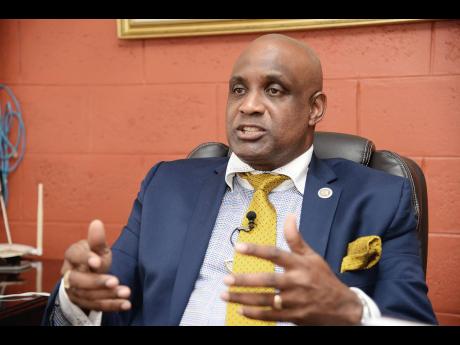Money muddle - PAAC questions contractual arrangement, payments to US-based CMU consultant
Gail Campbell Dunwell, a United States-based Jamaican, was given a two-year, J$20-million contract last January to serve as a consultant to the Caribbean Maritime University (CMU), and by the end of the first year, she pocketed a shade under J$15 million, or three quarters, of the total contract value.
According to documents the CMU turned over to the Public Administration and Appropriations Committee (PAAC) of Parliament, the contract took effect on January 12, 2018, nine days after Campbell Dunwell submitted her first invoice of US$3,050 or J$396,500.
By February 25, she had raked in a total of US$86,188 or J$11 million.
CMU President Professor Fritz Pinnock confirmed that Campbell Dunwell directed that some of the payments – a total of J$3.8 million – be made to an account in the name of another woman he identified as Doreen Miller.
The information triggered questions from some opposition members of the PAAC about whether Miller was the woman who was employed as a domestic helper to discarded Education Minister Ruel Reid.
The CMU documents show that Campbell Dunwell requested amounts of US$70,000 or J$9.1 million on six invoices that were all dated February 20, 2018.
Campbell Dunwell’s last invoice of US$1,448 to the CMU was dated December 4 last year, which pushed her total earnings from the CMU for 2018 to US$114,722.62 or J$14.9 million. The CMU said it collected a total of US$374,170 (approximately J$49 million ) in donations and grants through her consultancy work.
She was also making J$3.5 million a year doing the same consultancy work for the National Education Trust, an entity that also falls under the education ministry.
Dr Grace McLean, permanent secretary in the Ministry of Education, Youth and Information, has revealed that Campbell Dunwell’s contract with NET is on hold, pending legal advice sought from the Attorney General’s Chambers.
The disclosures, which came during yesterday’s meeting of the Public Administration and Appropriations Committee (PAAC) of Parliament, raised fresh questions about the contractual arrangements between the CMU and Campbell Dunwell, who was hired to source financing from international donors.
Pinnock had previously told members of the PAAC that Campbell Dunwell was engaged under a reimbursable expense contract, meaning that she would only be paid based on invoices submitted.
Yesterday, he was confronted by opposition member Mikael Phillips with a contract agreement between the CMU and Campbell Dunwell, which said: “For services provided hereunder, consultant shall be paid the sum of United States one hundred and fifty-five thousand dollars.
“Consultant or consultant’s employee shall only be entitled to payment or reimbursement for travel expenses, food, lodging, any per diem allowance, equipment, supplies, or similar items if authorised in advance by client,” the document continued.
Pinnock, in his response, sought to explain that the figure included in the contract was “the maximum for the life of the contract”.
“So you would have paid out US$114,000 of that within the first year of her contract?” Phillips questioned.
“Yes, sir,” the CMU boss replied.
Phillips was not satisfied with the response.
“So the balance that you have for her could carry her to do out all the work she was contracted to do?” he pressed.
“Well, the whole arrangement, initially, we were looking for a total of US$2 million … in grant funding, etc, etc. But when you write grant funding, you load up in the earlier part of the agreement, but the results would come a year, year and a half later,” he sought to explain.
Seeking to explain the payments made to Campbell Dunwell before the contract became effective and the huge sums paid out a month later, the CMU boss said that many of the projects were in the pipeline before 2017.
“But we would not have entered the agreement until we were sure some monies would start coming into CMU. To get grant funding, you have to get into people’s budget, so those would start from the previous year,” he said.
Phillips was not convinced and made this clear to the CMU president.
“I have no confidence in the information that has been provided to me that it is so,” he said.

